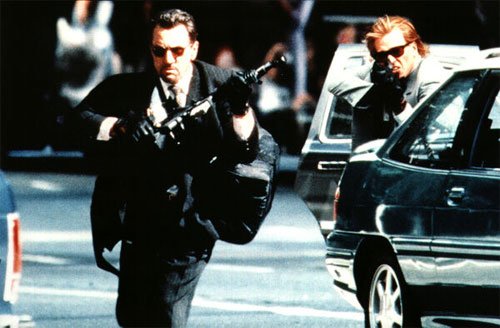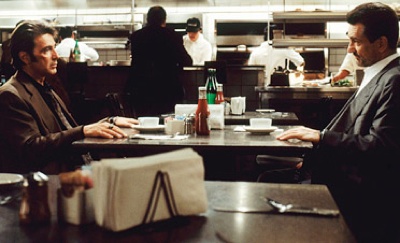Robert
De Niro and Val Kilmer shoot up L.A in Heat

"Don't
let yourself get attached to anything you are not willing to walk out on
in 30 seconds flat if you feel the heat around the corner."
That’s
Robert De Niro’s Neil McCauley, a professional thief leading an insular
life in Michael Mann’s 1995 crime classic, Heat. It’s the kind of
attitude you need when your idea of a good time is driving a truck into
an armoured car to steal 1.6 million dollars. Especially when a rouge
member of your team, Waingro (Kevin Gage), murders one of the guards,
necessitating killing the other two to avoid leaving witnesses.
McCauley’s philosophy is his self-preservation mechanism, designed to
prevent his capture and imprisonment. That is, however, what the tough
snap-at-any-moment cop, Vincent Hanna, played by Al Pacino, most
desires. He, like McCauley, is equally detached from others. He prefers
to keep company with the criminals he hunts so obsessively. This pleases
neither his wife, Justine (Diane Venora), nor his attention deprived
step-daughter (Natalie Portman, in her second film).
McCauley, despite knowing Hanna is monitoring their every move,
subsequently plans a 12 million dollar heist in Downtown L.A. This sets
the scene for a phenomenal extended action sequence. Its virtuosity is
in its technicality: the way Mann shoots it with frequent POV shots,
Elliot Goldenthal spare percussive musical score. It’s cold, epic and
brutal with a grim sense of reality. It’s here that Blu-ray comes into
its own, with the thunderous automatic weapon fire rattling all 5.1
channels.
But though it may have been marketed as one, Heat is no action
picture. It is instead a layered portrait of two men on either side of
the law, both trying and failing to have it all. It deals specifically
with their relationship to their women: Hanna to Justine, McCauley to
his new girlfriend Eady (Amy Brenneman), and Chris (Val Kilmer), another
member of McCauley’s team, to Charlene (Ashley Judd). They try but fail,
the most long lasting kinship developing between the two lead
adversaries.

Clash
of the Titans
It’s
perverse that Mann casts two megastars and yet keeps them apart bar one
central scene. Taking a break from pursuing each other, Hanna and
McCauley stop at a coffee shop and discuss each other in matter-of-fact,
detached words. By their own admission, they are two sides of the same
coin.
Heat is epic. Not in the same way as The Lord of the Rings
or Lawrence of Arabia, but epic in the scope of its depiction of
the cops and robbers circulating the underbelly of Los Angeles. There
are at least half a dozen more significant characters that flesh out the
world, including William Fichtner as an out-of-his-depth businessman and
Jon Voight as one of McCauley’s few trusted associates, but the one that
looms largest is the city itself. It’s an L.A. of greys and blues, one
where the line between good and evil is not clearly defined.
While it’s disappointing that this release has no Blu-ray specific
special features – they are the same that featured on the 2-disc DVD –
they themselves are excellent. There’s a commentary by Mann, which is
not wall-to-wall but interesting, eleven deleted scenes and five
documentaries. The featurettes are a mixture of 1995 interviews and
retrospectives created around the time of the release of the original
DVD. There’s about an hour worth of material, the best of which are
“Crime Stories” and “Into the Fire”, which give an in depth discussion
of the film’s long gestation period (Mann couldn’t get it financed until
shooting a TV movie on the same subject called L.A. Takedown),
training the cast to use automatic weapons, shooting the climactic
battle and the choice of soundtrack. Much of the cast and crew,
including Mann, De Niro, Pacino, Kilmer, Judd and Tom Sizemore are
interviewed. These extras are unsurprisingly presented in full-frame SD.
The quality of the feature presentation is, however, splendid and a
perfect match of Mann’s uncomplicated style. The washed out cold tones
don’t leap out at you as some other, more flashy films, but it’s
beautiful and understated, a perfect reflection of the characters and of
a Los Angeles divorced from its typical sunny, Hollywood image. It’s
this layered depiction of the city and its two damaged protagonists that
elevate what could have easily been a simplistic heist movie. Heat
is a modern classic.